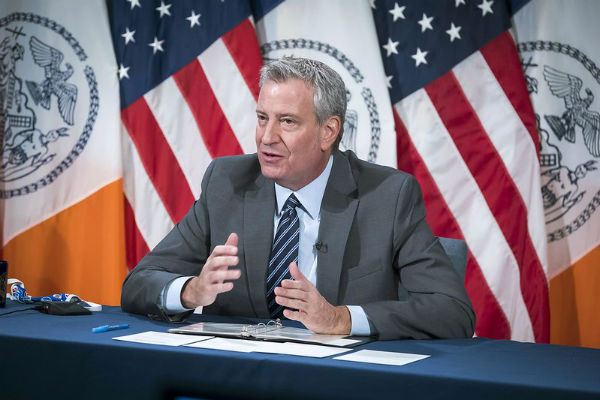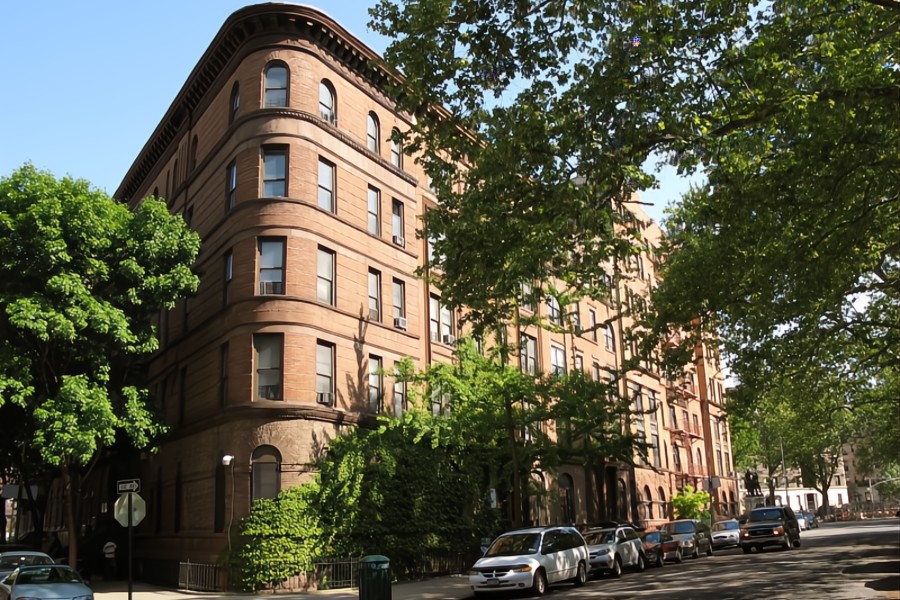 Mayor Bill de Blasio and the New York City Economic Development Corporation (NYCEDC) today released a Request for Proposals (RFP) seeking partners to launch and operate the Pandemic Response Institute (PRI), a new institution.
Mayor Bill de Blasio and the New York City Economic Development Corporation (NYCEDC) today released a Request for Proposals (RFP) seeking partners to launch and operate the Pandemic Response Institute (PRI), a new institution.
The institution will be dedicated to preparing New York City for future pandemics and public health emergencies.
The Institute is part of an ongoing vision, outlined in Mayor de Blasio’s State of the City address, to make New York City the public health capital of the world.
Supported by a commitment of $20 million in City funds, the PRI will work to make the best aspects of New York City’s response to COVID-19 permanent, while addressing gaps in health infrastructure for the future – especially those that have disproportionately caused harm to communities of color and others facing structural inequities.
“New York City is determined to do more than recover from COVID-19. We will become the public health capital of the world – and ensure that no matter what the future holds for us, our city can mobilize immediately to keep New Yorkers safe,” said Mayor Bill de Blasio. “The PRI will drive innovation, expand our life science capacity, and create job opportunities to drive a recovery for all of us.”
“Investing in New York City’s public health infrastructure will steel the city against future health emergencies and supercharge our economic recovery,” said Deputy Mayor for Housing and Economic Development Vicki Been. “Establishing the Pandemic Response Institute is a core component of this approach, and we look forward to the responses from potential operators of this space.”
The PRI, which will commence operations this year, will convene and coordinate City agencies, communities, industry, and academia to prevent, prepare for, respond to, and recover from future public health emergencies.
It will pursue three main strategies:
- Health Solutions and Innovation: Throughout the pandemic, there has been widespread innovation by industry, academia, and community. However, lack of coordination has led to bottlenecks in bringing these innovations to all groups equitably. The PRI will promote research and development into innovations in public health delivery.
- Data and Information for Decision Making: Data sources on health are held across multiple organizations and silos, and clear and consistent information has sometimes been difficult for both policymakers and community members to obtain and trust during the pandemic. The PRI will work to gather and integrate health data so all New Yorkers have clear, actionable, and reliable information.
- Community and Workforce Capacity Building: COVID-19 demonstrated the importance of local organizations and a culturally and linguistically relevant workforce to reach hard-hit communities. Local CBOs are often best able to overcome trust barriers and reach the most vulnerable. A limited pipeline of workers with specialized skills that require more extensive training in fields like epidemiology and data science has led to an undersupply of labor, especially among people of color. The PRI will form partnerships to support local organizations to help fill these gaps.
These strategies are the product of six months of engagement by the City with public health, industry, academic, and community leaders.
In December 2020, the City issued a request for information seeking perspectives from community-based organizations and public health leaders to inform the creation of the Pandemic Response Institute.
In January, NYCEDC and the New York City Department of Health and Mental Hygiene (DOHMH) convened leaders across academia, industry, and public health to evaluate lessons learned in the pandemic and assess how the City could become a global leader in research, innovation, and pandemic preparedness and response.
The City has held dozens of individual stakeholder meetings with New Yorkers from 55 different neighborhoods and NYCHA developments.
Consistent themes of those conversations included the need for improved coordination between levels of government and institutions across society; the importance of developing health innovations and supply chains before and when public health emergencies occur; and the need to embed a racial equity lens in the work of the PRI.
Proposals for the RFP are due on Friday, June 4, 2021. The City is especially interested in responses from parties that represent multiple perspectives related to public health emergency response. Details and submission information can be found online at https://edc.nyc/pandemic-response-institute-rfp.
This effort builds on the Administration’s long-term recovery agenda, which places public health and social justice at the center of the City’s recovery.
“As we continue to respond and recover from COVID-19, it’s imperative that we prepare for future health emergencies, said NYCEDC Acting President Rachel Loeb. “By taking advantage of the City’s position as a leader in medical research and innovation, the Institute will provide critical insight to address future pandemics and strengthen our capacity to advance health equity for all New Yorkers.”
“We always knew that New York City would emerge stronger from the COVID-19 tragedy, and the Pandemic Response Institute is one of those strengths,” said Mitchell Katz, MD, President and CEO of NYC Health + Hospitals. “The PRI will give us critical insight into addressing future pandemics, and it will ensure that there’s an equitable response for all New Yorkers.”
“A recovery for all of us aspires to make New York City the public health capital of the world,” said Dr. Jay Varma, Senior Advisor for Public Health. “By investing in a new institute, the City can bring together the best from government, our universities, our biotech and technology sectors, and our civic organizations. Together, they can spur economic development, build a stronger workforce, and ensure New York City can beat back any health threats it faces in the future.”
“NYC Emergency Management looks forward to collaborating with the institute as it advises and complements NYC government through all phases of emergencies to create stronger, more inclusive, and more resilient communities supported by innovation and research,” said Deanne Criswell, NYC Emergency Management Commissioner.
“Gaps that were created by racism and discriminatory disinvestment drove the disparities of this pandemic,” said Department of Health and Mental Hygiene First Deputy Commissioner and Chief Equity Officer Dr. Torian Easterling. “As we look forward into the future, centering racial equity, health equity and economic justice will be key to ensuring that the City’s communities of color do not suffer so disproportionately from public health crises.”
“I applaud the NYCEDC for bringing the Pandemic Response Institute one step closer to reality,” said Council Member Paul Vallone. “COVID-19 has shown us that we must have our own robust response to future pandemics to ensure that this level of devastation never happens to our City again.”
“New York City can only respond effectively to public health emergencies if we are prepared for them ahead of time in a way that addresses all residents and neighborhoods. That is why implementing strategies with community partners via the Pandemic Response Institute is so essential. I encourage all organizations interested in a just and equitable public health approach to apply for this opportunity to lead us toward a more resilient city,” said Council Member Carlina Rivera.
“Ensuring that the city’s public health system can rapidly respond to a future health crisis will be a critical factor in protecting the health of New Yorkers and our economy,” said Maria Gotsch, President and CEO, Partnership Fund for New York City. “This Pandemic Response Initiative lays the important groundwork to ensure that all New Yorkers have access to relevant information and health solutions.”
“New York City has been home to The Rockefeller Foundation for nearly 108 years and at the frontlines of the Covid-19 pandemic for over 14 months. Data has played a key role in the city’s Covid-19 response and is essential to protecting the city from future health threats,” said Zia Khan, Senior Vice President for Innovation, The Rockefeller Foundation. “The Foundation applauds the city’s proposed development of a Pandemic Response Institute to enable early disease outbreak warnings and equitable responses capable of protecting the health and well-being of all New Yorkers.”
“Building on the lessons learned from the current battle against Covid-19, the Pandemic Response Institute envisions enabling collaborative and equitable responses to future disease outbreaks,” said Claire Pomeroy, MD, MBA, President, Lasker Foundation. “By leveraging public-private-community partnerships, the Institute has great potential to position the City as an innovative leader in creating a healthier future for all.”
“If we’ve learned anything through this past year, it is the invaluable role that strong partnerships and networks across sectors have in building an accessible public health system for New Yorkers,“ said Sharmila Rao Thakkar, Executive Director, Staten Island Not For Profit Association/Staten Island COAD. “We commend this effort to bring stakeholders across the city together and look forward to the critical role the Institute will have in leading efforts to prepare, respond, and recover from public health crises in the future — particularly through the lens of equity and access for all our city’s residents.”
“In partnership with Mayor Bill de Blasio, the Pandemic Response Lab (PRL) helped New York City go from being an epicenter of the pandemic to a gold standard example of recovery. While that speaks to the resiliency, talent, resourcefulness, and dedication of New Yorkers, it also calls out NYC as a global leader in life sciences innovation for rolling out an industrial-scale diagnostic solution to combat the pandemic,” said Jonathan Brennan-Badal, CEO of Opentrons Labworks, Inc. “Mayor de Blasio is continuing to demonstrate NYC’s leadership in pandemic preparedness with the development of the Pandemic Response Institute and we are honored to have worked alongside city officials as they have developed their thinking on this vital investment in the future health of the city.”
Become a Harlem Insider!
By submitting this form, you are consenting to receive marketing emails from: . You can revoke your consent to receive emails at any time by using the SafeUnsubscribe® link, found at the bottom of every email. Emails are serviced by Constant Contact








